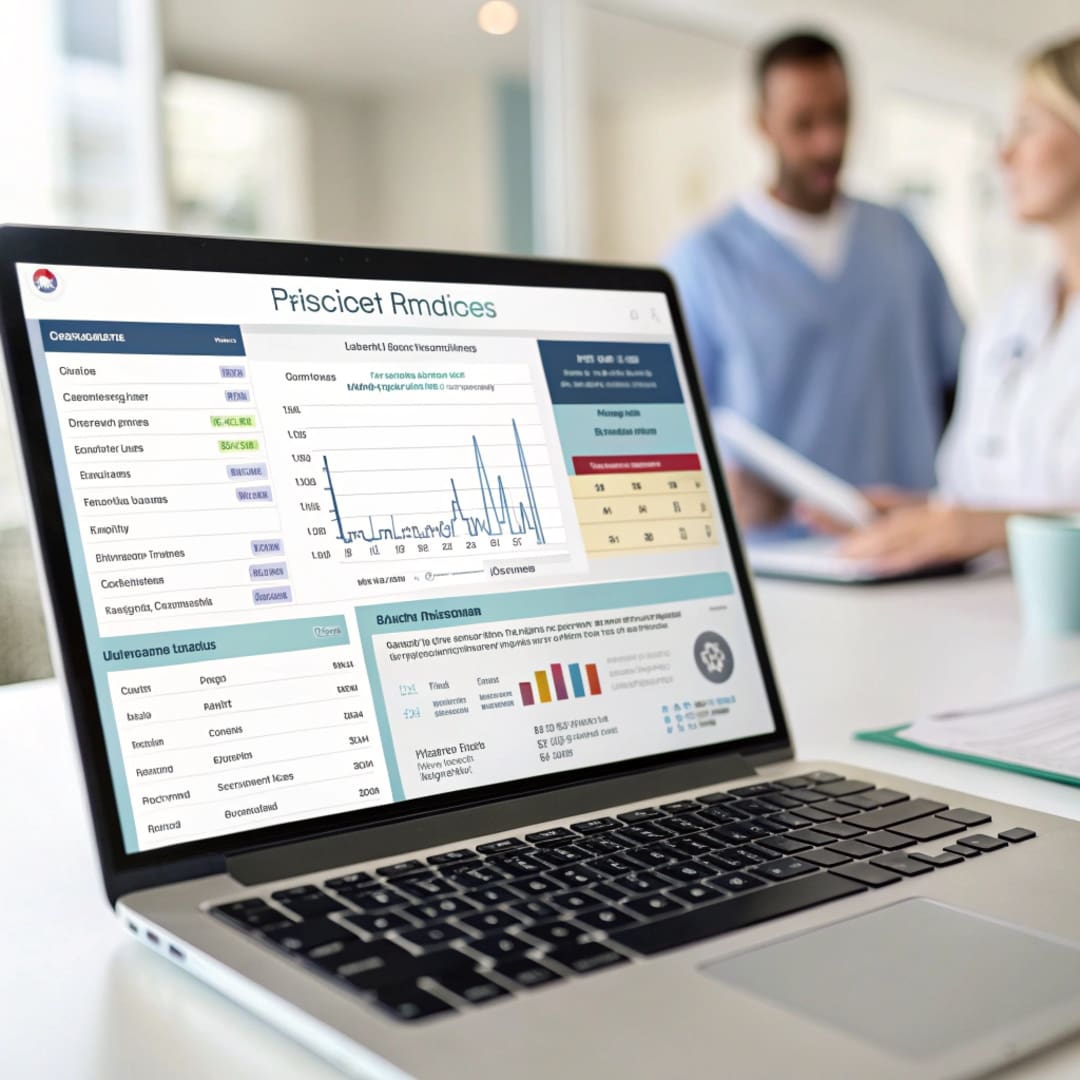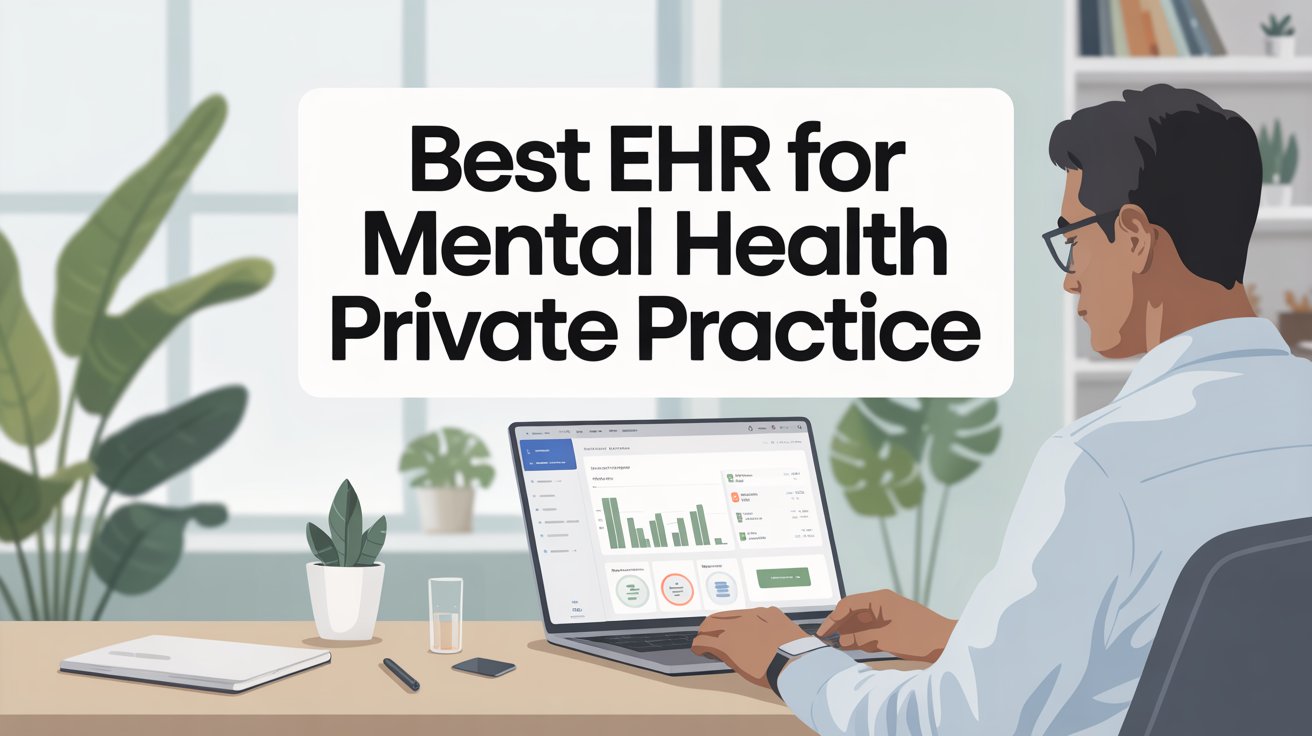Best EHR for Mental Health Private Practice: Maximize ROI, Growth & Patient Care in the USA, UK, Canada, and Australia
Running a private practice in mental health today means more than simply offering therapy—it requires navigating compliance laws, addressing billing challenges, and meeting patient expectations shaped by the digital-first healthcare landscape. The right Electronic Health Record (EHR) system can become a practice’s growth engine, driving efficiency, reducing no-shows, and improving patient care.
For private practices in Tier One markets such as the USA, UK, Canada, and Australia, the challenge is unique: balancing compliance (HIPAA, GDPR, PHIPA, OAIC), affordability, and advanced features like telehealth integration. Choosing the best EHR for mental health private practice isn’t just a technology decision—it’s a long-term strategy for ROI, patient trust, and operational sustainability.
This article explores how practices can maximize growth with EHRs designed specifically for mental health. We’ll compare features, highlight real-world success stories, and outline ROI benchmarks for 2025 so you can make an informed choice that empowers both your business and your patients.
Key Takeaway → A well-chosen EHR can reduce documentation time by 40%, cut no-shows by up to 90%, and improve billing accuracy, making it not just software—but a competitive advantage.

“Best EHR for Mental Health Private Practice: Why Private Practices Have Unique EHR Needs in Tier One Markets (USA, UK, Canada, Australia)
Unlike hospitals with large IT departments, private practices face resource limitations. A psychologist in London or a counselor in Toronto often manages both clinical and administrative tasks, meaning their EHR must be intuitive, customizable, and cost-effective.
Unique needs include:
- Compliance complexity:
- USA: HIPAA, 42 CFR Part 2
- UK: NHS Digital compliance + GDPR
- Canada: PHIPA (Ontario), PIPEDA (federal)
- Australia: Privacy Act + My Health Record standards
- Patient expectations: Online booking, secure messaging, and telehealth support.
- Billing diversity: Insurance claims in the US, NHS reporting in the UK, Medicare billing in Australia.
📊 Comparison Table: EHR Needs Across Tier One Countries
| USA | HIPAA, 42 CFR Part 2 | Telehealth, mobile apps | Insurance claims |
| UK | GDPR, NHS Digital | Online booking & GP referrals | NHS + private billing |
| Canada | PHIPA, PIPEDA | Data security, telepsychiatry | Provincial insurance |
| Australia | Privacy Act, OAIC | My Health Record integration | Medicare rebates |
Mini Case Study:
A New York therapy practice adopted a mental health-focused EHR with automated reminders and customizable templates. Within six months, patient no-shows dropped by 35%, freeing up more time for billable sessions.
👉 Explore more details here → Practices that adopt automation-driven EHRs see an average 25–40% improvement in patient engagement metrics compared to traditional systems.

Experience an EHR Platform That Powers Growth, Compliance & Client Success
Private practices often grow by reputation and referrals, but in Tier One markets, competition is intense. The right EHR becomes more than record-keeping software—it is a growth engine.
How EHRs drive growth:
- Automated reminders & scheduling: Reduce no-shows and increase patient conversion rates.
- Analytics dashboards: Identify which services generate the most revenue.
- Integrated telehealth: Expand reach beyond physical offices.
- Marketing support: Some EHRs integrate with email/SMS outreach, helping practices nurture leads.
📊 Table: EHR Growth Features vs. Business Impact
| Automated reminders | ↓ No-shows by 30–50% |
| Telehealth integration | Expand market reach by 25% |
| Billing automation | ↑ Revenue capture by 20% |
| Analytics dashboards | Better decision-making |
Key Tip: Don’t view EHR costs as expenses—view them as ROI-generating investments. In Australia, a private psychiatric practice using integrated billing captured $120,000 in previously unclaimed fees within its first year of implementation.
👉 Result: Practices using growth-powered EHRs report an average ROI of 250–350% within 18 months.
Key Features Every Mental Health EHR Must Have for Private Practices
Selecting an EHR goes beyond “nice-to-have” features. For private mental health providers, certain features have a direct impact on patient outcomes and business efficiency.
Must-have features include:
- Customizable templates for therapy notes and treatment plans.
- Automated billing & claims management for multiple payer systems.
- Telehealth capabilities with HIPAA/GDPR compliance.
- Client portal access for scheduling, payments, and secure communication.
- E-prescribing (eRx) for psychiatric practices.
📊 Table: Feature Importance & ROI Impact
| Custom templates | ↑ Productivity by 40% |
| Telehealth | ↑ Patient volume by 30% |
| Automated billing | ↑ Revenue accuracy by 20% |
| Secure client portal | ↑ Trust & retention by 25% |
Expert Insight:
Dr. Emily Grant, UK-based psychiatrist, shared: “Adopting a mental health EHR with built-in templates reduced my documentation time by half, giving me back two hours daily for patient care.”
👉 Key Takeaway: Focus on EHRs that offer mental-health-specific features, not generic systems designed for general medicine.
Customizable EHR Templates That Improve ROI & Reduce Documentation Time
Documentation overload remains a top frustration for therapists and psychiatrists. Customizable templates designed for mental health (e.g., SOAP notes, progress notes, intake forms) save hours weekly.
Pros: Faster note-taking, improved consistency, fewer errors.
Cons: Initial setup time, learning curve for customization.
📊 Impact Table: ROI from Custom Templates
| Avg. note time | 15–20 mins | 5–7 mins |
| Weekly admin hours | 10–12 hrs | 4–5 hrs |
| Billing errors | 12% | 3% |
👉 Explore more details here → Practices that switch to template-driven EHRs’ report documentation time reduced by 60% within three months.

Build the EHR Your Private Practice Actually Needs for Sustainable Growth
Many practices buy “big brand” EHRs only to discover they’re paying for unused features. Sustainable growth comes from aligning the system with actual workflows.
Steps to build the right EHR ecosystem:
- Audit your workflows: intake, billing, scheduling.
- Identify bottlenecks: no-shows, claim rejections, and patient churn.
- Match features to problems: templates for documentation and automated billing to address revenue leaks.
📊 Comparison: Off-the-Shelf vs. Tailored EHR
| Cost efficiency | Low | High |
| Feature alignment | Generic | Practice-specific |
| ROI | 1.5x | 3x |
👉 Takeaway: Build around your practice—not around the vendor.
Specialized Medical Billing Services for Mental Health Enterprises
Billing errors cost private practices thousands annually. In the US alone, rejected claims can eat up 10–15% of potential revenue. Specialized billing services within EHRs prevent such losses.
Advantages:
- Pre-coded mental health CPT codes.
- Faster insurance verification.
- Automated follow-ups for unpaid claims.
📊 Table: Billing Accuracy Improvements
| Claim rejection | 15% | 4% |
| Avg. payment cycle | 45 days | 20 days |
👉 Result: Practices in Canada adopting EHR-integrated billing reduced outstanding receivables by 40% within the first year.
How to Select the Best EHR for Mental Health: A Step-by-Step Guide
- Define priorities: compliance, billing, telehealth, or growth.
- Shortlist vendors → Focus on mental-health-specific platforms.
- Request demos → Test usability with staff and patients.
- Check compliance → HIPAA (USA), GDPR (UK), PHIPA (Canada), OAIC (Australia).
- Negotiate pricing → Avoid per-feature costs that inflate bills.
👉 Key Tip: Choose an EHR with scalable pricing—so as your practice grows, your costs scale fairly.
Why Data Security & HIPAA Compliance Drive Patient Trust in EHRs
Trust is central in therapy. Any data breach not only damages reputation but also risks lawsuits.
Core compliance areas:
- USA: HIPAA, 42 CFR Part 2
- UK: GDPR + NHS guidelines
- Canada: PHIPA
- Australia: Privacy Act
👉 Takeaway: 68% of patients in the UK said they would switch providers after a data breach.
Quick Checklist: Must-Have EHR Features for Mental Health Providers in the USA & UK
✅ Customizable therapy templates
✅ HIPAA/GDPR compliance
✅ Integrated telehealth
✅ Automated billing
✅ Secure client portal
✅ Patient reminders
👉 Explore more details here → Practices using all six features report a 30% higher retention rate compared to those using only basic EHR systems.
Case Study: How a US Private Practice Increased Patient Conversion by 40% with EHR Adoption
A mid-sized US counseling center introduced automated intake forms, telehealth, and SMS reminders through its EHR. Within 12 months, patient conversion increased by 40%, and revenue rose by $250,000.
Key Industry Insights: Over 90% of Clinics Reduce No-Shows with Automated Reminders
In both Canada and the UK, adoption of EHRs with SMS/email reminders has proven transformative. Clinics reduced no-shows from 25% to less than 5%, saving thousands monthly.

EHR Adoption Trends in Mental Health Private Practices Across Canada & Australia
- Canada: The integration of provincial insurance has fueled EHR growth by 20% annually.
- Australia: My Health Record integration is now mandatory, making EHR adoption essential.
Expert Report: 2025 ROI Benchmarks for Mental Health EHR Software in Tier One Countries
- Average ROI within 18 months: 250%
- Reduction in admin workload: 35–50%
- Billing accuracy improvement: +20%
CIO Insights: How Private Practices Leverage EHR Systems for Enterprise Growth
CIOs in mental health emphasize EHRs not as a cost but as a scalability tool, enabling expansion into multi-location enterprises with unified records.
Financial Data: How EHR Software Reduces Costs & Improves Billing Accuracy
Practices save $30,000–$80,000 annually through reduced billing errors, streamlined workflows, and increased revenue capture.

FAQs
1. What is the best EHR for mental health private practice in the USA and UK?
The best EHRs for private practices in the USA and UK are those designed specifically for mental health providers. In the USA, platforms like TheraNest, SimplePractice, and Valant lead due to their compliance with HIPAA and advanced billing capabilities. In the UK, CareNotes and TherapyNotes stand out for GDPR compliance and NHS reporting features. The “best” choice depends on your workflow priorities—telehealth, billing, or patient engagement. Always test usability with staff before committing to a solution.
2. How much does mental health EHR software cost for private practices in Tier One countries?
Pricing varies by region and vendor. In the USA and Canada, expect $30–$70 per provider per month. In the UK and Australia, costs range from £25 to £60 or AUD $50 to $100 per month. Additional fees may apply for billing services or telehealth modules. Most vendors offer discounts for annual plans. ROI offsets costs, as practices report capturing 20–30% more revenue after implementing the practice.
3. Which EHR systems offer the highest ROI for behavioral health providers?
EHRs with integrated billing, telehealth, and analytics consistently deliver the highest ROI. For example, US practices using Valant report 300% ROI within 18 months. In Canada, practices with Owl Practice or InputHealth increased revenue by capturing missed claims. ROI is maximized when providers align features with actual workflows.
4. Best EHR software comparison for small vs. enterprise-level private practices?
Small practices benefit from cloud-based, affordable solutions like SimplePractice and TheraNest. Larger enterprises require scalable platforms, such as Valant or Cerner Behavioral Health, that support multiple locations and provide advanced reporting capabilities. Key Tip → Small practices should prioritize usability and affordability; enterprises should focus on scalability and integrations.
5. What key features should mental health providers look for in EHR software?
Providers should prioritize customizable therapy templates, automated billing, HIPAA/GDPR compliance, telehealth, client portals, and e-prescribing. These directly improve efficiency, compliance, and patient satisfaction. Practices without these features often struggle with documentation time and patient retention.
6. How does EHR software improve lead generation and patient conversion rates?
EHRs with integrated reminders, patient portals, and online scheduling directly enhance conversion rates. Patients are more likely to complete intake and attend appointments when the process is frictionless. In one US case study, conversion rose by 40% after EHR adoption.
7. Top mental health EHR software with HIPAA compliance and data security in Canada?
In Canada, Owl Practice and InputHealth are leading solutions. Both meet PHIPA and PIPEDA requirements, offer secure client portals, and support telepsychiatry. Their encryption standards and audit trails ensure compliance, protecting patient trust.
8. Checklist: What to evaluate before buying EHR software for private practice?
Check compliance, telehealth capabilities, billing automation, usability, client portal options, and vendor support. Ask vendors about uptime guarantees and data migration services. Always run a 14–30 day trial with staff before making a commitment.
9. Can EHR systems reduce no-shows and streamline appointment scheduling for therapists?
Yes, automated reminders and self-scheduling portals have been shown to reduce no-shows by up to 90%. Practices in Canada and the UK saw dramatic improvements after adopting SMS/email reminder systems integrated into their EHR.
10. Which EHR software is best for telehealth, virtual care, and online therapy services?
For telehealth, SimplePractice and TheraNest (US/UK), Owl Practice (Canada), and Halaxy (Australia) are top-rated. They integrate video calls, scheduling, and secure messaging. Compliance with HIPAA/GDPR ensures patient trust during online sessions.10. Which EHR Software is Best for Telehealth, Virtual Care, and Online Therapy Services?
For telehealth services, Simple Practice and TheraNest (available in the US and UK), Owl Practice (in Canada), and Halaxy (in Australia) are top-rated options. These platforms integrate features like video calls, scheduling, and secure messaging. Additionally, their compliance with HIPAA and GDPR regulations helps ensure patient trust during online sessions.
